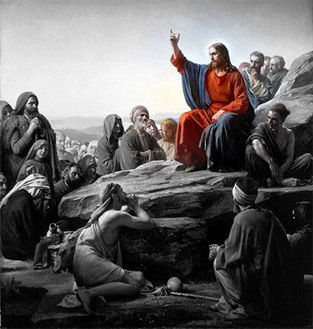가톨릭 신앙생활 Q&A 코너
|
Biblical Justice - The Beatitudes Reveal God’s Ultimate Justice |
|---|
|
2011-01-09 ㅣ No.997 Father Thomas Rosica -- The Beatitudes Reveal God’s Ultimate Justice
The Beatitudes Reveal God’s Ultimate Justice — A Biblical Reflection for the Sixth Sunday in Ordinary Time, Year C2010년 2월 11일 목요일 오전 12:00:00
Today’s Gospel presents us Luke’s Beatitudes taught on the plain [6:17-26] where people from all walks of life intermingle. The reference to the coastal region of Tyre and Sidon in v 17 means that not only Jews from Judea and Jerusalem, but even Gentiles from outside Palestine come to hear Jesus. Luke’s version of Matthew’s Sermon on the Mount has many Today’s Gospel text [Luke 6:17, 20-26] contains the introductory portion of the sermon and consists of blessings and woes that address the real economic and social conditions of humanity. By contrast, Matthew emphasizes the religious and spiritual values of disciples in the kingdom inaugurated by Jesus ["poor in spirit," Matthew 5:5; "hunger and thirst for righteousness," Matthew 5:6]. In all the blessings and woes, the present condition of the persons addressed will be reversed in the future. At the core of Luke’s version of the sermon is Jesus’ teaching on the love of one’s enemies [6:27-36] that refers to God’s graciousness and compassion for all humanity [6:35-36] and Jesus’ teaching on the love of one’s neighbor [6:37-42] that is characterized by forgiveness and generosity. Almost all the words of Jesus reported by Luke are found in Matthew’s version. Jesus’ prophetic outreach Jesus’ entire ministry, which was centered on the proclamation of the Kingdom of God, took place around the northern shore of the Sea of Galilee, in an area noted for its violence and warring factions. Jesus seeks to bring justice into the violence of this area. The crowds that listened to Jesus were awestruck because he spoke with authority, with the force of someone who knew the truth and offered it freely to others. The Beatitudes reveal God’s ultimate justice. They outline Jesus’ prophetic outreach to those who live on the fringes of society. In this awesome Gospel scene overlooking the Sea, Jesus puts biblical justice into practice by proclaiming the Beatitudes. Authentic justice is a bonding of one’s self with the sick, the disabled, the poor and the hungry.
Jesus is the new code of holiness The Beatitudes are not an abstract code of behavior. Jesus is the poor in spirit, the meek, the persecuted, and the peacemaker. He is the new “code of holiness” that must be imprinted on hearts, and that must be contemplated through the action of the Holy Spirit. His Passion and Death are the crowning of his holiness. Holiness is a way of life that involves commitment and activity. It is not a passive endeavor but rather a continuous choice to deepen one’s relationship with God and to then allow this relationship to guide all of one’s actions in the world. Holiness requires a radical change in mindset and attitude. The acceptance of the call to holiness places God as our final goal in every aspect of our lives. This fundamental orientation towards God even envelops and sustains our relationship with other human beings. Becoming the people of the Beatitudes I cannot read, pray or hear the Beatitudes proclaimed without recalling with great emotion the voice of Pope John Paul II speaking about the Beatitudes to hundreds of thousands of young people who were gathered in Toronto, Canada, for World Youth Day 2002. The theme of the “Beatitudes” guided our World Youth Day experience and has deeply marked us at Salt + Light Television in Canada, born on the wings of that blessed event almost eight years ago. Let us recall with gratitude the words of the Venerable John Paul II:
Putting the Beatitudes into practice today We must hold up the Beatitudes as a mirror in which we examine our own lives and consciences. Looking at Jesus, we see what it means to be poor in spirit, gentle and merciful, to mourn, to care for what is right, to be pure in heart, to make peace, to be persecuted. How can we be disciples of Jesus and put into practice Christ’s teaching of the Beatitudes? This week, let us ask ourselves some tough questions about Jesus’ powerful lesson on a Galilean hillside. Does the difference in the Beatitudes in Matthew and in Luke provide any special insights for me? Which of the Beatitudes speaks most powerfully to me? Why? Am I poor in spirit? Am I humble and merciful? Am I pure of heart? Do I bring peace? Am I ‘blessed,’ in other words, happy? What is my understanding of biblical justice? How do I practice it in my life? And let us pray with the Venerable Pope John Paul II:
Father Thomas Rosica, CSB 0 416 0 |


